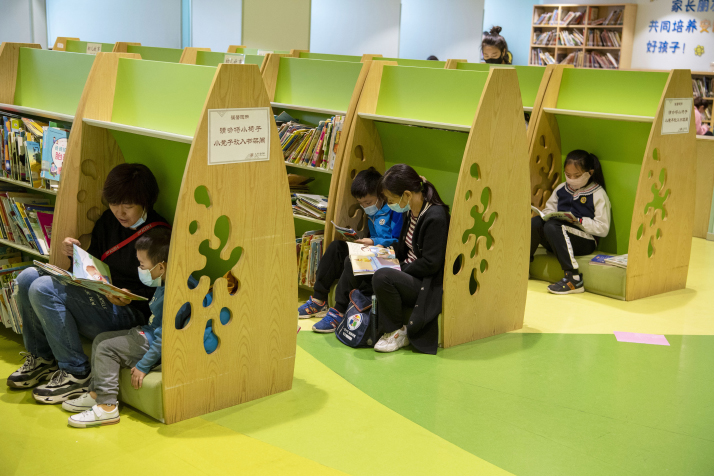| Society |
| New law adopted to provide guardians with more guidance in family education | |
| Explaining the Family Education Promotion Law, a blueprint for teaching and learning | |
|
|
 Parents and children read books at a library in Taiyuan, capital of Shanxi Province, on October 5 Children play around at a ski resort in Fusong, Jilin Province, on November 17 (XINHUA)
There is a saying that parents are their children's first teachers. Family education concerns the growth of a child and therefore affects a country's development and social stability. Chinese parents are known for their intense involvement in their offspring's life, but some do not know how to be good parents. Now, a new law offers guidelines. Chinese lawmakers adopted the Family Education Promotion Law, the first of its kind in the country, in late October, which is scheduled to take effect on January 1, 2022. The law stipulates that parents or other guardians of minors shall be responsible for family education, while the state, schools and society will provide guidance, support and services for family education. Introduced in response to the government's drive to reduce student workload, the new law bans parents from placing excessive academic burdens on their children, stipulating that guardians of minors must appropriately arrange children's time for study, rest, recreation and physical exercise. For a long time, an excessive academic burden posed a prevalent problem in China's compulsory education system. In July, the central authorities issued guidelines for reducing the burden of over-the-top homework and off-campus tutoring in compulsory education. Thanks to the introduction of the policy, students can start school later each morning, finish their homework at school, and no longer need to attend off-campus training and tutoring institutions during weekends. Not just family business Sun Hongyan, head of youth and children research at the China Youth and Children Research Center, told Minsheng Weekly that the adoption of the law has changed the status of family education. "Family education is now no longer only a family's business; it's the country's business. It has a bottom line and those who cross the line will be breaking the law," Sun said. The law has clarified the role of guardians and tells them how to carry out family education. It has also stipulated the role of the country, stating that all levels of government, enterprises, public organizations and social organizations bear responsibility for family education and should provide related support to guardians. "All of society is paying increasing attention to education. In the meantime, people have also been thinking about what the goal of education should be," Yuan Ningning, a researcher specializing in law related to minors at the China University of Political Science and Law, said. "The fundamental task of education should be to cultivate people with moral integrity. To achieve the goal, the role of family education should be emphasized," he said. The law requires guardians to guide minors to improve their moral standards, physical being, life skills and conduct in order to promote their all-round and healthy growth. However, some parents have questions about the new law. A mother surnamed Wang who works for an Internet company in Beijing said her first reaction upon hearing about the new law was suspicion. "Will I break the law in the process of parenting?" she asked herself. She said that in the traditional conception, family education is a private affair and not supposed to be governed by law. However, after learning more about the new legal stipulations, she found that her understanding of the law was one-sided. "We still have autonomy. It only comes into play when the parents' dereliction of duty has a negative effect on their child." After comparing her parenting with the legal stipulations, Wang found that she doesn't spend enough time with her son as she is preoccupied with work. "I will try to spend more time with my kid in the future," she said.  Children play at a ski resort in Fusong, Jilin Province on November 17 (XINHUA)
A lot to learn According to a recent survey of 1,149 parents of minors by China Youth Daily's social survey center, 80.7 percent of parents have multiple problems in providing family education and 94.7 percent expect the law to help them address their concerns in this regard. A mother surnamed Zhang working with an education institution in Beijing, told China Youth Daily that parents are paying more attention to students' education. However, they also have encountered more problems with family education than previous generations. They are learning about parenting methods by reading books, listening to lectures and consulting professionals. Zhang said she finds it hard to strike a balance: If she intervenes too much, she is worried about hurting her kid's self-esteem; but she is equally unwilling to "neglect" her. In response to parental perplexity, Baohua Primary School in Jinan, Shandong Province, has offered online courses for parents to address their issues. Through participating in the courses, parents' educational concepts and methods have changed and they are placing more emphasis on the development of their children's personalities and psychology. "Thanks to the new law, parents will be able to receive all kinds of guidance for family education through multiple channels. This is a law that can really empower them," Yuan said. Zhu Yongxin, Deputy Director of the Chinese Society of Education, said at a summit on family education in Shanghai in October that there are three vital points in family education, and the law has addressed all of them. He said that first, parents should spend time providing high-quality company to their children, and be involved in their children's lives and studies. This does not necessarily take a long time. As little as 30 minutes every day will do. Studies show that children who have had high-quality company during their childhood years are more independent, confident and more responsible for their families and other people after they reach adulthood. Second, parents should help students form good habits by setting good examples. If parents often play computer games at home, children are likely to imitate them and spend their leisure time doing the same. If parents often read and discuss the books, children are likely to naturally fall in love with reading. According to Zhu, children with good habits are more likely to succeed and be happy in life. Third, both parents should be directly involved in family education. This is not only a mother's responsibility; a father, too, should do his part. The law addresses these points with guidelines. For instance, it stipulates both parents should take part in family education. Zhu said fathers and mothers play different roles in family education and have their respective advantages. Both parents should use their strengths to complement one another in the provision of family education in order to produce better results. The law also spells out punishments such as criticism and admonition for violators, and it provides that, in the event they also violate other laws, they are subject to punishment under those laws such as the Law on the Protection of Minors, and the Anti-Domestic Violence Law. (Print Edition Title: The Legal Parenting Guide) Copyedited by G.P. Wilson Comments to jijing@bjreview.com |
|
||||||||||||||||||||||||||||
|
